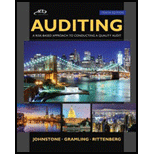
The accounting and auditing literature discusses several different types of accounting changes. For each of the changes listed below (a. through c.), indicate whether the auditor should add a paragraph to the audit report, assuming that the change had a material effect on the financial statements and was properly justified, accounted for, and disclosed. Assume that the organization is a U.S. non-public company.
a. Change from one GAAP to another GAAP
b. Change in accounting estimate not affected by a change in accounting principle
c. Change in accounting estimate affected by a change in accounting principle
d. Correction of an error
c. Change from non-GAAP to GAAP (a special case of correction of an error)
Want to see the full answer?
Check out a sample textbook solution
Chapter 15 Solutions
Auditing: A Risk Based-Approach to Conducting a Quality Audit
 Auditing: A Risk Based-Approach (MindTap Course L...AccountingISBN:9781337619455Author:Karla M Johnstone, Audrey A. Gramling, Larry E. RittenbergPublisher:Cengage Learning
Auditing: A Risk Based-Approach (MindTap Course L...AccountingISBN:9781337619455Author:Karla M Johnstone, Audrey A. Gramling, Larry E. RittenbergPublisher:Cengage Learning Auditing: A Risk Based-Approach to Conducting a Q...AccountingISBN:9781305080577Author:Karla M Johnstone, Audrey A. Gramling, Larry E. RittenbergPublisher:South-Western College Pub
Auditing: A Risk Based-Approach to Conducting a Q...AccountingISBN:9781305080577Author:Karla M Johnstone, Audrey A. Gramling, Larry E. RittenbergPublisher:South-Western College Pub- Business/Professional Ethics Directors/Executives...AccountingISBN:9781337485913Author:BROOKSPublisher:Cengage



